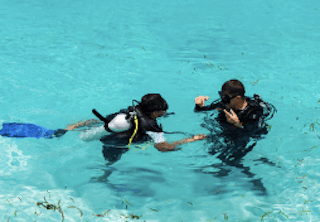Last Updated on May 11, 2021 by Dan
Barotrauma is the damage caused to ears, lungs, or other parts of the body by a change in air pressure. It occurs when the atmospheric pressure changes, for example during ascent or descent during scuba diving. Barotraumas can also occur near bodies of water from sudden change in ambient air volume due to wave motion.
There are three common types of barotrauma:
1) Air embolism – This occurs when gas bubbles enter your bloodstream and block blood vessels. Symptoms include dizziness, shortness of breath, and pain in the chest area.
2) Eardrum rupture – This happens when there’s a sudden increase in air pressure that forces fluid from inside your ear into areas outside of it. Symptoms include hearing loss and ringing/hissing sounds in both ears. This is called Auricular Squeeze – The middle ear space can be at risk from excessive air or fluid trapped inside, which causes pain when trying to swallow or yawn.
3) Lung injury – Gas bubbles can enter your lungs, causing severe breathing trouble. Symptoms include chest tightness or pain and shortness of breath. This is also called Lung Squeeze! When there is not enough expandable tissue available for gas expansion (such as with emphysema) lung barotrauma will occur during ascent if no other release mechanism is present.
Ultimately this can lead to death in extreme cases. Barotrauma is essential type of pressure injury that results in a failure to equalize pressure within the body’s gas spaces and the surrounding environment.
During descent, volume will decrease (Boyle’s law) and, if not equalized by squeezing the air space (e.g., nose) or breathing deeply and exhaling slowly, high pressure will build up in the middle ear region or alveoli of lungs. pain will be felt due to the swelling of the surrounding tissues as they attempt to move into the space to equalise the pressure. When a further decrease in volume occurs, tiny blood vessels will rupture. Resultant bleeding will reduce the volume and therefore relieve pain.
During ascent, if the equalization does not occur the gas will expand )according to Boyle’s Law) and ascent barotrauma will result if the increased volume is not released via normal passages. This condition is also referred to as a “reverse squeeze”.
Less common types of barotrauma are:
Tooth Squeeze – Due to tooth decay, there may be air between a tooth and a filling. Upon ascent the compressed air in the tooth may expand and cause mild to severe pain, the tooth could also break.
Epiglottal Squeeze- Air expands within the larynx causing it to close, trapping air in your throat without being able to breathe out through your mouth.”
Mask Squeeze- Pressure from a tight-fitting mask will increase the risk of barotrauma by blocking off airways. Avoid the use of goggles that do not allow for equalization. Exhale into the face mask, when pressure is felt.
Gut Squeeze – Gas produced during the digestion process can also cause discomfort to the diver. Divers experiencing pain on ascent should stop ascent until pain subsides, or descent again to relieve pain. Avoid heavy meals and/or soft-drinks before diving.
Consult your dive buddy, instructor or dive doctor if you are experiencing any discomfort.

